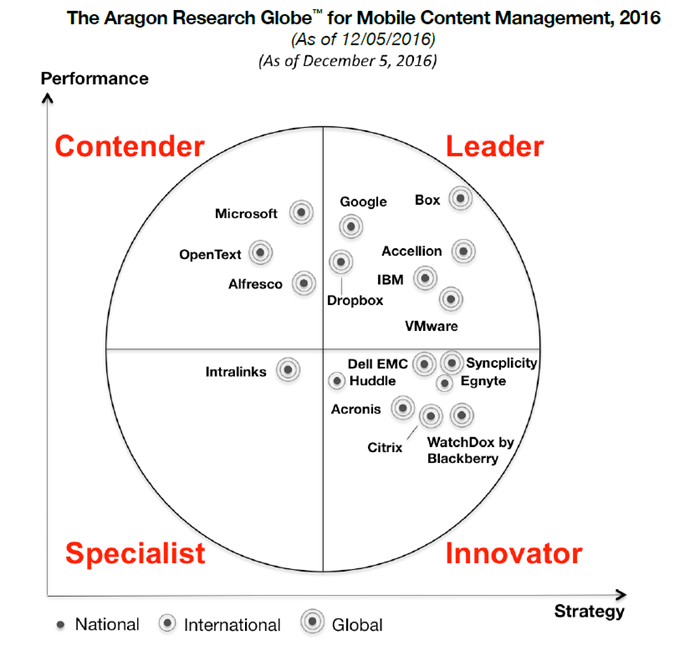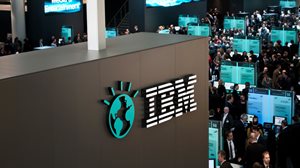Jim Lundy of Aragon Research on Mobile Content Management
In December, Aragon Research, a technology-focused research and advisory firm, announced the publication of its third Globe™ report for Mobile Content Management, 2016 which is designed to guide enterprises that are in the process of considering potential Mobile Content Management solutions for their business, by providing an in-depth analysis of seventeen providers in Mobile Content Management ranked as either a Leader, Innovator, Contender, or Specialist. Hot on the heels of the Globe report, CMS-Connected reached out to Jim Lundy, the author of the report, CEO and Lead Analyst at Aragon Research, to hear his first-hand thoughts on the MCM Market.
I will refer back to his talking points from the interview when I am discussing the market overview shortly. But, before diving into which vendor performed well and where the industry is heading, for those who are not acquainted with the report, I would like to take a moment to briefly explain how Aragon ranks vendors and what each sector means. The research firm rates vendors in four categories:
-
Leaders: The vendors that have comprehensive strategies which align with industry direction and market demand, and successfully execute those strategies. Accellion, Box, Dropbox, IBM, Google, and VMware are named as Leaders.
-
Contenders: The vendors that have a strong performance, but with more limited or less complete strategies. Alfresco, Microsoft, and OpenText are chosen as contenders.
-
Innovators: The providers that have strong strategic understanding and objectives, but have yet to perform effectively across all elements of their strategy. Acronis, Citrix, Dell EMC, Egnyte, Huddle, Syncplicity, and WatchDox are placed under the Innovators category.
-
Specialists: The vendors that fulfill their strategy well, but have a narrower or more targeted emphasis with regard to overall industry and user expectations. Intralinks is named as Specialist.

Source: The Aragon Research Globe™ for Mobile Content Management, 2016
Aragon measures vendors based on three sets of criteria:
-
Strategy, which “reflects the degree to which a vendor has the market understanding and strategic intent that are at the forefront of market direction”
-
Performance, which “represents a vendor’s effectiveness in executing its defined strategy”.
-
Global reach, which is a measure of the global capability that a vendor can deliver.
The Leaderboard
Accellion
Accellion is the content platform provider focused on secure file sharing and collaboration. Its flagship offering kiteworks, Accellion’s private cloud content collaboration platform, has been cited as one of the most secured in the market in the Globe report. According to Jim Lundy, its selling point is that the vendor offers multiple cloud deployment options (SaaS, Private -on premise- and hybrid) as this eliminates the hassle of a major migration. Another differentiator of Accellion cited in the report is that the vendor provides a full SDK, meaning that its platform can easily be connected to other platforms and processes. Besides its multiple deployment options, its mobile app support and security across multiple content repositories are pointed out by Jim Lundy as the vendor’s strengths. Download the report to find more in-depth analysis of the platform.
 "Leading enterprises globally are embracing the transformation to the digital workplace to enhance collaboration, workflows, and overall productivity," commented Hormazd Romer, Vice President of Marketing at Accellion. "kiteworks plays a critical role in enabling organizations to achieve this digital transformation with a content collaboration platform that not only streamlines collaboration with external partners but also extends existing content systems without a risky and costly migration."
"Leading enterprises globally are embracing the transformation to the digital workplace to enhance collaboration, workflows, and overall productivity," commented Hormazd Romer, Vice President of Marketing at Accellion. "kiteworks plays a critical role in enabling organizations to achieve this digital transformation with a content collaboration platform that not only streamlines collaboration with external partners but also extends existing content systems without a risky and costly migration."
Box
Box, based in Redwood City, California, is an online file sharing and content management service for businesses. The report cited that Box’s annual revenue is approaching US $400M. According to Jim Lundy, the main drive behind this unprecedented growth is the vendor’s strategic partnership with IBM on Box Relay, a new workflow solution that will be available natively in Box. The reason, is that this Box-branded offering gives the vendor an edge over its competitors, especially, in the case of “complex ECM-type deals.” Another strength of Accellion cited in the report is that with the Box SDK and APIs, enterprises are able to build mobile applications to muscle their content stored in Box. Lastly, the ease of integrating Box into Mobile Apps is one of the prominent differentiators the vendor has in the market. In the report, you can find more in-depth analysis of the platform.
Dropbox
2016 was an eventful year for Dropbox. As you may recall, in June, Cloud syncing and sharing software  company Dropbox launched a slew of new business-oriented productivity features in an effort to woo larger businesses, including an update to its official iOS app, that enables users to quickly scan text-based documents and convert them into files, so it can identify and remember printed text. Furthermore, Dropbox expanded partnerships with Adobe, DocuSign, HP, and IBM, and announced a new partnership with Symantec in November 2016. According to the Globe report, the vendor has currently 200,000 customers. As a result of all the new enhancements and partnerships the vendor has announced, they continued their success.
company Dropbox launched a slew of new business-oriented productivity features in an effort to woo larger businesses, including an update to its official iOS app, that enables users to quickly scan text-based documents and convert them into files, so it can identify and remember printed text. Furthermore, Dropbox expanded partnerships with Adobe, DocuSign, HP, and IBM, and announced a new partnership with Symantec in November 2016. According to the Globe report, the vendor has currently 200,000 customers. As a result of all the new enhancements and partnerships the vendor has announced, they continued their success.
Although the new features seem to work in terms of making the user experience more robust as well as more enterprise friendly, the platform is still perceived as a customer offering in the market. However, as its VP emphasized, the company is not done changing yet, so it’ll be intriguing to see what comes next and if they will help Dropbox expand from file-syncing and sharing into the far larger market of cloud-based collaboration. In the report, you can find more in-depth analysis of the platform.
Google
The Globe report cites that Google Drive is still one of the fastest ways to manage content from mobile devices and one of the few technology providers that are capable of leading against Microsoft in the Cloud Office Suite market. Another differentiator the platform has is that the vendor recently “added ISO/IEC 27018:2014 privacy standard to its compliance framework and has been FISMA certified for years.” Considering that security is one of the biggest barriers to the cloud, this gives the vendor a leg up. Its very reasonable pricing - $5 or $10 dollars per user per month - also makes the platform appealing. In the report, you can find more in-depth analysis of the platform.
IBM
 With a significant investment in its MaaS360 Mobile Content Management, IBM demonstrated its commitment to the market. Now that containers can be fully encrypted and it has strong policy management features, the vendor has strengthened its platform’s security. Its integration capabilities with other MCM platforms such as Box, Dropbox, OneDrive, and Microsoft SharePoint are presented as one of the biggest advantages of the platform. According to Jim Lundy, “bundling MCM with its flagship MaaS360 Enterprise Mobility Management (EMM) Platform Suite and leveraging IBM ECM capabilities when large enterprises want to leverage MCM.” However, overlap with IBM ECM offerings is one of the biggest challenges. Download the report to find more in-depth analysis of the platform.
With a significant investment in its MaaS360 Mobile Content Management, IBM demonstrated its commitment to the market. Now that containers can be fully encrypted and it has strong policy management features, the vendor has strengthened its platform’s security. Its integration capabilities with other MCM platforms such as Box, Dropbox, OneDrive, and Microsoft SharePoint are presented as one of the biggest advantages of the platform. According to Jim Lundy, “bundling MCM with its flagship MaaS360 Enterprise Mobility Management (EMM) Platform Suite and leveraging IBM ECM capabilities when large enterprises want to leverage MCM.” However, overlap with IBM ECM offerings is one of the biggest challenges. Download the report to find more in-depth analysis of the platform.
VMware
An enterprise-grade file sync and share solution, VMware Content Locker protects users’ sensitive content in a corporate container and provides users with a central application to securely access, store and distribute the latest documents from their mobile devices. The platform has been updated for 2016 with an intuitive user interface on iOS and advanced search features. Its differentiator is, though, to make it easy to review Videos. The Globe report finds its focus on vertical solutions in industries such as aerospace, pharmaceutical, and financial services as the primary factor behind the vendor’s success. With Content Locker, users can store content in existing repositories, such as Box, Microsoft SharePoint, and Network File Shares. Its challenge cited in the report is the awareness outside the Enterprise Mobility Management market. Download the report to find more in-depth analysis of the platform.
The Market Overview
In the rise of digital transformation, the importance of managing mobile content has become essential for  enterprises. During the interview above, Jim Lundy touched upon the increasing price and functionality pressure on smaller providers as the products are getting better and more intuitive at a faster pace. He also couldn’t stress it more that no matter what, first and foremost, the product has to work well and be easy to use.
enterprises. During the interview above, Jim Lundy touched upon the increasing price and functionality pressure on smaller providers as the products are getting better and more intuitive at a faster pace. He also couldn’t stress it more that no matter what, first and foremost, the product has to work well and be easy to use.
When it comes to the major changes, compared to the previous publication of the report, he pointed out that all the vendors have started offering more advanced functionality and workflow such as Box Relay. He explained with an example, saying that in the past, users were supposed to purchase expensive offerings to move content around like today. Another major change he mentioned was a user interface on mobile as it used to be a differentiator but today all the vendors are offering this by default.
In the market, focus on ease of business has accelerated but the biggest capability is openness, according to Jim Lundy, meaning that the ability to integrate with other platforms, such as Salesforce or Dynamics 365, and processes while the content can be displayed on the other applications but still be stored in MCM repository.
Given that openness and flexibility, Cloud has been a game changer in the mobile content management space just like in other industries. Jim Lundy says that there is still a vast opportunity to migrate content into the cloud as Aragon Research estimates that over 87% of content is still on premise. However, there are some barriers to the cloud. The biggest challenge he emphasized was the privacy concerns. He spoke from experience and said that their clients in Europe, for example, do not want their content to be stored in an American cloud. The good news is, the vendors realized the issue fast enough and responded with more flexible options. “Today providers have many more cloud options than they did have even 2 years ago," he said. With multiple deployment solutions, today users can store some of their content on-premise, or have it in the Asian cloud and the European cloud versus the American cloud.
Relating to the security concerns, Lundy also mentioned about an interesting anecdote he has with his clients: “Considering email is the largest content management system in the world, most major enterprises would say ‘yeah we have been off of on-premise email for the last couple of years.’ Then we have a discussion with them: Wait a minute! You are having issues with moving your content to the cloud but you already moved your email and you are sharing a lot of content in the cloud for your email system. So why is it such a big deal?”
His recommendation to the vendors that aim to increase their market share is offering a platform that works well, is easy to use, and flexible. To do that, they need to focus on partnerships and integrations as the ability to integrate with other applications, and other legacy ECM applications is key to meeting enterprises’ needs. At the end of the day, most large companies and mid-size companies are not going to replace their ECM platforms due to their huge investments in record management but they can move some of their content to MCM. When that happens, though, for the compliance purpose, they still may need to connect that up with an ECM repository. So vendors that can provide that easily will win the deal, according to Jim Lundy.
His recommendation to buyers, though, is to ask “Can salespeople access content in their CRM applications?” This functionality alone saves them 15-20 minutes out of their work process. Therefore, before inquiring on this capability, it is important to audit the applications they have and which one needs to be connected.

Venus Tamturk
Venus is the Media Reporter for CMS-Connected, with one of her tasks to write thorough articles by creating the most up-to-date and engaging content using B2B digital marketing. She enjoys increasing brand equity and conversion through the strategic use of social media channels and integrated media marketing plans.